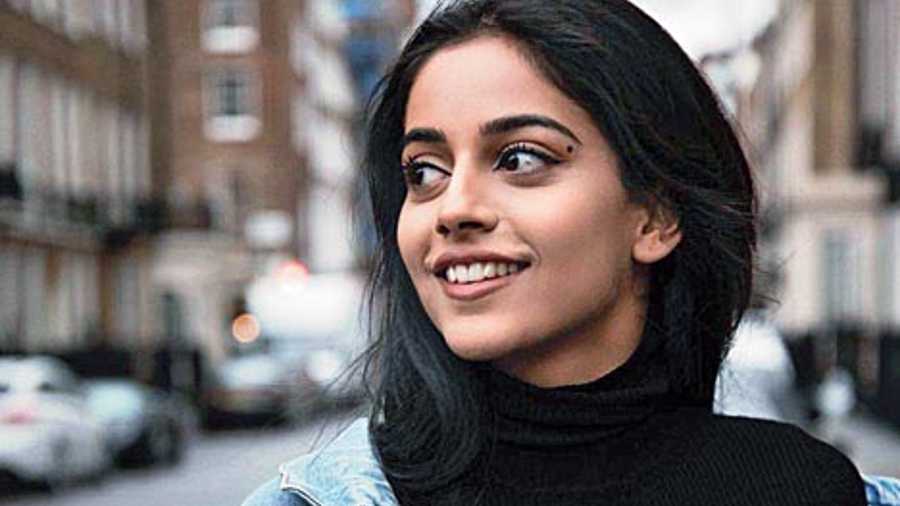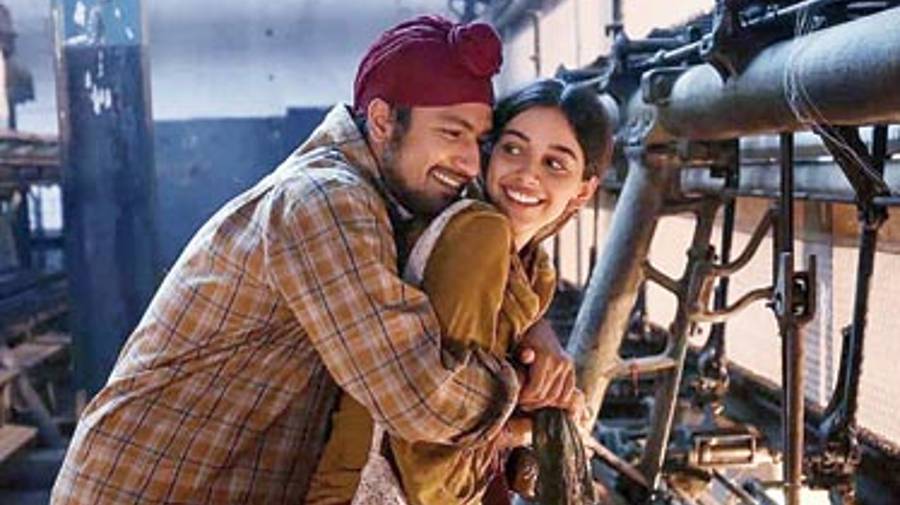Three years ago, Banita Sandhu caught our attention in October. Her Shiuli, in the Shoojit Sircar film, may not have had much screen time, but she was the pivot around which the drama of that poignant and powerful film unfolded. Now, Banita — who was born and brought up in Wales and has been acting since age 11 — plays the part of Reshma, opposite Vicky Kaushal, in Shoojit’s much-feted film Sardar Udham, streaming on Amazon Prime Video. Over a Zoom call, we chatted with Banita on becoming Reshma, being directed by Shoojit once more and the choices she’s making as an actor.
Both your director Shoojit Sircar and co-star Vicky Kaushal have described your Reshma in Sardar Udham as “poetry”. The film is being talked about so much since release. What are you hearing about Reshma?
As Shoojit sir and Vicky very generously said, Reshma is poetry on screen. There is a certain innocence and love about Reshma. More importantly, what we are hearing about the film consistently is that this is how a biopic should be made. It’s a story that needed to be told, and Vicky’s performance (as Udham Singh) is just one of the best that I have ever seen. I genuinely feel that this is one of Shoojit sir’s best films, if not his best. It’s really so overwhelming how positive the feedback has been. I am really, really grateful to have just been a part of this movie, to be honest.
Is it now a given that if Shoojit Sircar approaches you with a role, you will definitely do it?
Yes! One hundred percent! (Laughs) Who would say ‘no’ to Shoojit Sircar? I would never dream of it! I can’t say ‘no’ to him. He’s a genius, he’s a master of his craft.... Every experience I have had working with him has been so enriching and I am so grateful to have featured in two of his films till now. It means a lot to me. He’s been my mentor since the beginning of my career. He holds a very special place in my heart and I think he is not just one of the best film-makers in India, he’s one of the best in world cinema.
What was your understanding of Reshma and how did you go about playing her?
With Reshma, we had a certain amount of creative liberty because there is literally nothing about her in textbooks or in history. I didn’t have the pressure that Vicky and Amol (Parashar, who plays Bhagat Singh in the film) had of actually playing a legitimate real-life character who has been written about in history books.
Reshma is deaf and mute, and I wanted to play her very authentically. I had a great teacher named Neelam, who works in a special school for the deaf and mute in Pingalwara (in Punjab). I would visit that school every day and observe the kids there, either in class or have conversations with them. Some of them came to the shoot and got to meet Vicky and Shoojit sir and know what a film set looks like.
It was a really collaborative experience and a lot of people put a lot of work into the film. I just tried to do the best with what I had, and luckily I had a lot of resources at my disposal in order to play Reshma.

Banita Sandhu Sourced by the correspondent
Though she belongs to a different era, did anything about Reshma resonate with you?
She’s Punjabi and so am I... I am pure-blooded, full, full, full Punjabi! (Laughs) I have been asked about the kind of preparation that I put in to play a girl from the village considering I grew up in the UK, and I actually didn’t really need to. It kind of fell into place the moment I went to shoot. It all felt very natural and like home to me. I have spent a lot of time with my dadima hearing stories about my roots, and Punjab and its people are in my blood. I just hoped that would translate on screen. It’s funny because I hadn’t been to Punjab before, but when I went to shoot this movie, I genuinely felt at home there. It was so real to me and the whole experience was so culturally enriching for me.
You followed up October with the American sci-fi series Pandora and then starred in the Tamil film Adithya Varma before jumping on to Sardar Udham. These are very, very diverse choices. How are you going about your career now?
My choices are predominantly driven by gut and instinct. That’s how I landed up in October, as well as the projects I signed up after that. I sign up for projects that speak to me and I just can’t say ‘no’ to them. Whether it’s a big role or a small one, in which language or in what country... none of that matters to me. I focus more on what the message of the movie is, who the team is... the grander scheme of things speak to me. I want to make movies that are timeless and touch the hearts of audiences. I follow my heart.
I know that it seems quite confusing to a lot of people because at one moment I am doing a British film, and then at another, a Hindi language film and then I am doing an American TV series, but for me, it just makes sense. At this point, I am an actress of world cinema. And to be honest with you, I am quite happy and fulfilled to be doing that.
The times we are living in greatly benefit me. I think we are globally experiencing a kind of renaissance in the TV and film industry. We were already moving in this direction, and the pandemic kind of hastened the process of streaming platforms having such prominence in the industry. There is now more creative liberty given to film-makers because one doesn’t have the pressure of numbers at the box office. Also, you reach a much wider audience.
When a film releases in cinemas, it’s limited to a certain region or a few countries. Through Amazon Prime Video, Sardar Udham has reached 240 countries at one go. It’s generating a lot of international conversations and that’s really what this film deserves. The horizons have really broadened and I am so grateful to be a part of the industry at this time.
What’s your acting process like?
I didn’t go to drama school and I haven’t studied acting. But I have been acting since I was 11. The agency I signed up as a kid would have weekly workshops that I was a part of. I have been part of this for so long that being on a film set feels like very natural to me. I am not a method actor at all, and I am a switch on-switch off actor. But I have my own kind of method, and on a film set, it is actually a skill to be able to zone out from all the chaos that’s going on around you and just be in the moment and be that character. And because I have been doing this for so long, it’s second nature to me now.
A few months ago, you were in Calcutta for the shoot of your film Kavita and Teresa. It got a little sticky because of the Covid situation and you had to go back. Will we see you coming back to the city to shoot?
Unfortunately, we were not able to shoot in Calcutta then. But I love the work that Bengali film-makers do, like Shoojit sir for example. Before I went in, everyone told me how good the food is out there, but I never got to try it! (Laughs) But I do plan to go back, hopefully soon, and I do plan to explore the city then.
